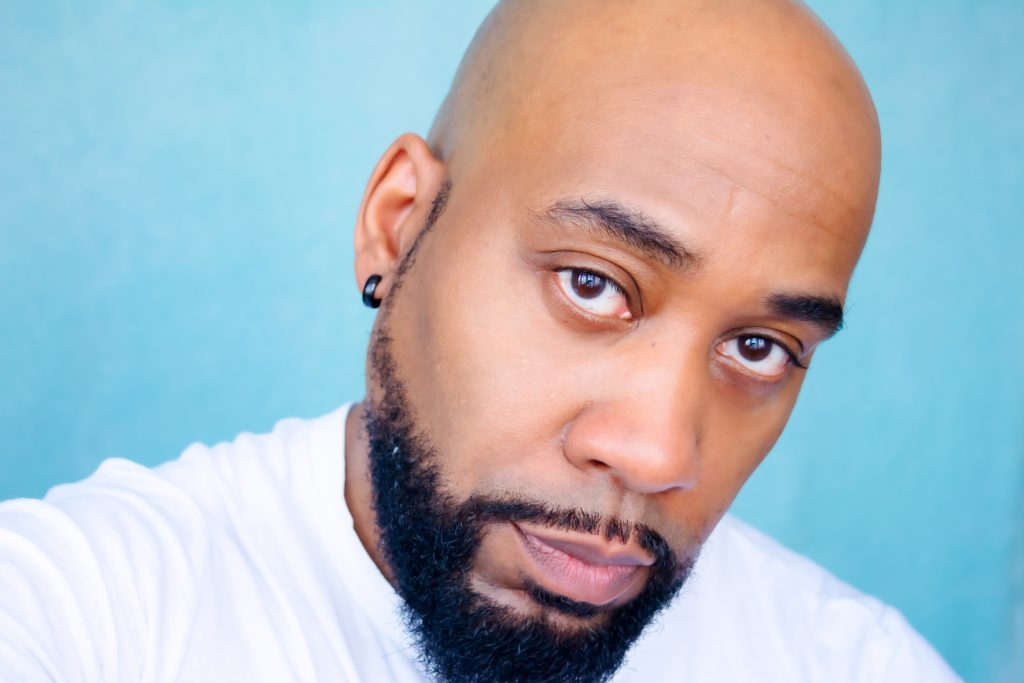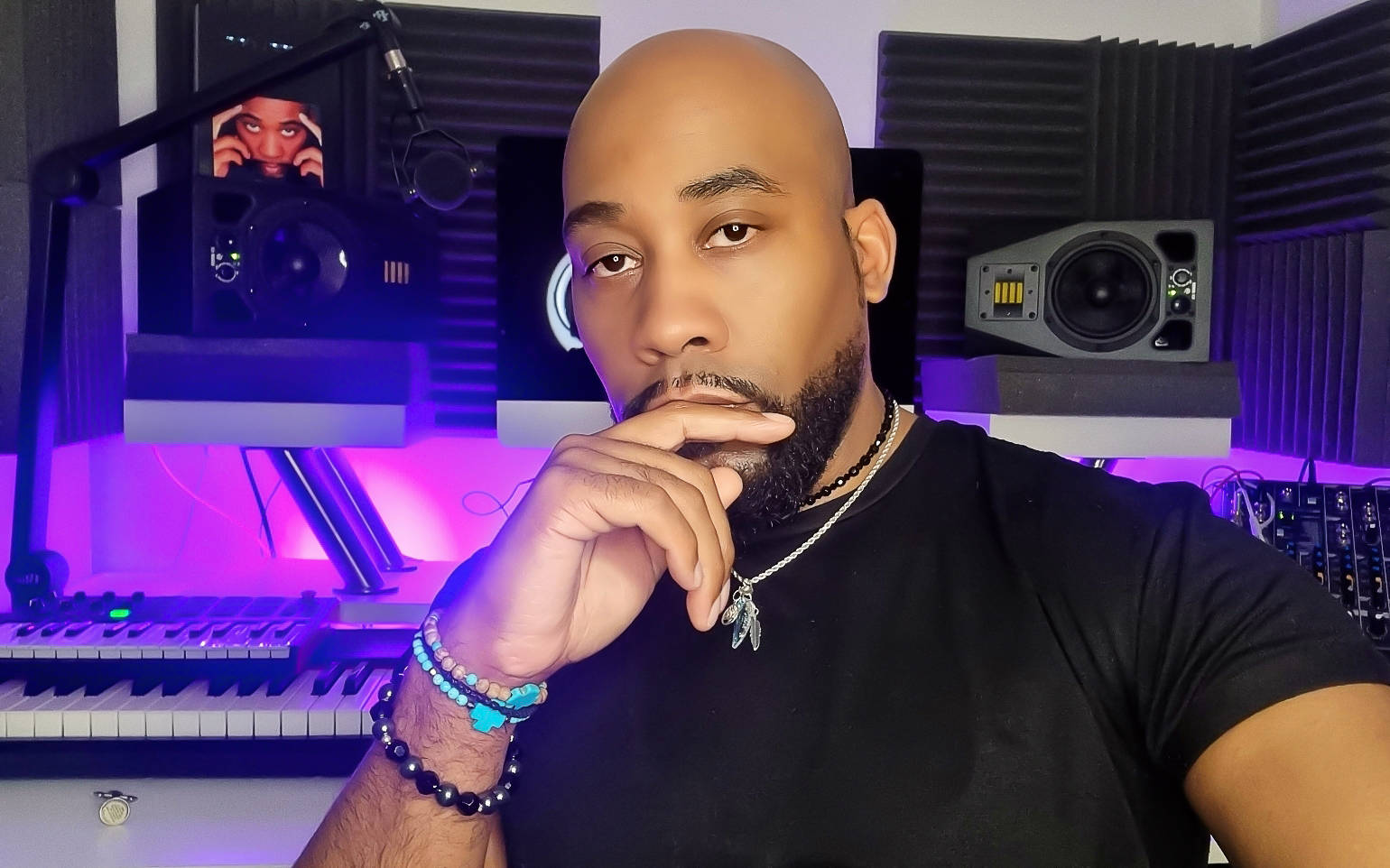Kule T is a British R&B-Soul singer-songwriter who blends a kaleidoscope of genres. His storytelling comes from honest and first-hand experiences. His first musical experiences came through the church, where he cultivated his craft as a drummer, guitarist and bassist. He soon joined the acappella group, Spirit.
He became one of the lead singers for MN8, an R&B pop group, and Kule toured with Janet Jackson and performed alongside Robbie Williams, Boyzone, Spice Girls, Madonna, Celine Dion and Backstreet Boys.
Kule’s solo career has included hosting and performing on Top of the Pops, appearing on BBC Radio 2’s ‘Sound Of The 90s’, BBC Radio 1 ‘The Scene with Jacueline Shepherd’, ‘At Home With Hayley’ on Sky TV, Never Mine The Buzzcocks and appearing on Happiful Magazine.
Kule T has connected with his fans through social media, sharing his life behind-the-scenes, and giving them access to his latest creations. His debut single ‘I Just Know You Wanna’ was the start of his solo artist journey. A brilliant personality and a promising star—Kule’s story is incredible and inspiring.
What are some of the things you want people to know about Kule T?
I am a singer songwriter, a producer and one of the lead singers of the 1990’s UK R&B band called MN8. MN8 had a hit single called ‘I Got A Little Something For You’ which went to number 2 in the UK Charts and number 1 in the R&B charts. We then went on to releasing, ‘Happy’, ‘If You Only Let Me In’, ‘Baby It’s You.’ These singles went to the top ten in the UK charts.
All 6 singles that were released reached the top ten in the UK R&B charts. We also received a gold album award in France, toured with Janet Jackson and had the song on the Bad Boys movie. I’m also a photographer and video editor.
When did you first get into music, and what was the most memorable piece of advice you received about your music at the start of your career?
I…remember that it was advised to keep other people’s voices and opinions out of your head and just to focus on your goals and nurture your craft.
I first got into music, playing the drums in church as an 11-year-old child. I then went on to playing the bass guitar and the piano. After this I then found real passion in singing and song writing. My first ever vocal performance, at the age of 18, I remember was me performing a song and I was very nervous. As shy as I was, I ended up singing a song whilst looking down at my shoes.
There was a moment of silence as I began to perform, and at the end of the song I heard a loud cheer and applause from the audience. That’s when I knew I was hooked. From this moment I recognised that I had talent and the ability to make people smile through music. The most memorable piece of advice given to me from the start was to believe in my abilities as an artist. I also remember that it was advised to keep other people’s voices and opinions out of your head and just to focus on your goals and nurture your craft.
What is your opinion on 90’s music?
90’s music to me lyrically had a way of pulling in your audience by telling a story. The story allowed the listener to disappear inside the song. Songs of the 90’s were written with reason and meaning behind the sound and the substance behind every song had a memorable hook that you would remember. This memory would last through the ages.
Using ‘I Got A Little Something For You’ as an example: you may not remember all of the verses but the chorus always stood out and made a permanent stamp in your memory. As much as I can appreciate modern day music, there is a very 90’s quality and style that is still coming through now as artists look back to that era for inspiration.

What is your creative process for song writing like? How does this unique approach compliment your performance as a singer?
Because my music comes from such a personal place when I perform, it resonates as being authentic.
My approach to song writing can vary depending on what emotional state I’m in. If we take as an example the track called “See Me” on my solo album “Emotional Rollercoaster”, with this song I captured an emotional state that was relevant to me at that time. I described a traumatic moment in my life where the thought of being a part of the human race did not appeal to me anymore.
I wanted to be a part of the spiritual world and embedded this sentiment within the hook line of the song, “I want you to see me, rub your eyes, wash your face, and read me.” This describes the feeling of not being noticed, understood or acknowledged, in your own surroundings. It is as though you were screaming in a room full of people, but no one can hear or see you.
Because my music comes from such a personal place when I perform, it resonates as being authentic. Therefore the audience can relate to the lyrics and the emotions that come with it. I have often had people message me giving thanks for creating a voice through my music that highlights delicate issues such as self-harm, mental health, and suicide.
How much do you believe that creativity is a product of nature and nurture?
I believe that everyone is born with an ability of some sort, and to find what that is takes time; nevertheless, once you discover the ability and your passion for it, you have to start to nurture that.
Creativity comes in many shapes and forms from the world around us. The way in which we nurture that creativity is different for everyone, all though it both are equally important.
Who are some of your heroes, and what did they do to earn that status in your mind?
I used to listen to Luther Vandross and I admired his ability to create an emotional response for his audience. His vocal tone and smooth approach to music made him stand out from the rest.
Stanley Clark is a jazz bass player who caught my attention in the unique way he plays. One of his songs changed my philosophy as a musician. When he played bass with a tap dancer it was unusual and had not been done at the time, so I never forgot it.
The list for me is endless from artists like Aretha Franklin, Al Jarreau, Joe, acapella group Take Six, Connor Reaves and many more. All of these artists had a unique vocal tone—simply unforgettable.

What’s the biggest challenge you’ve faced in your career so far, and how did you overcome it
So my next challenge was to believe in myself again. I had to find freedom from all the pain I held inside.
There have been quite a few challenges so far in my total career. The first would be a realisation that the person closest to you never understood who you were and never quite supported your dreams. This became a conflict which then took its toll on my health.
This resulted in an ambulance being called to my flat – me being hospitalised where I needed MRI and CT scans to find the problem.
I was told by doctors that I had possibly been suffering from internal bleeding. This was blood loss from and on the surfaces of my brain. I then had to have a lumbar puncture in my spine to remove fluid which unfortunately saw some complications. As a direct result of these complications I ended up not being able to work for a month. After this I then had to teach myself to walk again.
My emotional state was out of control, and I had no one to turn to but myself. Being hospitalised instantiated an illumination: I had to take back control. This was lost and had to be regained—in my mind. The only way I knew how to achieve this was music.
So my next challenge was to believe in myself again. I had to find freedom from all the pain I held inside.
What would you say to someone who says there’s no change in the music an artist produces over time?
I would say this to those artists: for one to grow as a creator, producer, and songwriter, one sometimes ought to break barriers and breach their comfort zone.
This is usually where the territory of a comfortable mindset has been entrenched. The way out? Explore different genres of music to make your own genre grow.
What do you think is the most important part of a song – lyrics, melody or rhythm and beat?
The ingredients for a good song are the right amount in each of the above-mentioned elements depending on the mood, subject or message you are trying to convey. However, in saying this, lyrics are important as they are the translation.
What are your plans for the future?
My plans for the future are to release a second album. There is a possibility of a tour coming up and I can’t say too much—watch this space! Also there will be a couple of TV and media appearances. Simply stay tuned!

Would you like to connect with Kule T, or just explore more?
Follow these links:


